Mr. Lane (Lex.) lays down, on the lines of Ibn Khallikan
(i. 476, etc.) and other representative literati,
as our sole authortties for pure Arabic, the precedence
in following order. First of all ranks the Jahili
(Ignoramus) of The Ignorance, the
: these pagans
left hemistichs, couplets, pieces and elegies
which once composed a large corpus and which is now
mostly forgotten. Hammad al-Rawiyah, the Reciter,
a man of Persian descent (ob. A.H. 160=777) who
first collected the Mu’allakat, once recited
by rote in a seance before Caliph Al-Walid two thousand
poems of prae-Mohammedan bards.[FN#445] After the Jahili
stands the Mukhadram or Muhadrim, the “Spurious,”
because half Pagan half Moslem, who flourished either
immediately before or soon after the preaching of
Mohammed. The Islami or full-blooded Moslem at
the end of the first century A.H ( = 720) began the
process of corruption in language; and, lastly he was
followed by the Muwallad of the second century who
fused Arabic with non-Arabic and in whom purity of
diction disappeared.
I have noticed (I Section A.) that the versical portion of The Nights may be distributed into three categories. First are the olden poems which are held classical by all modern Arabs; then comes the mediaeval poetry, the effusions of that brilliant throng which adorned the splendid Court of Harun al-Rashid and which ended with Al-Hariri (ob. A.H. 516); and, lastly, are the various pieces de circonstance suggested to editors or scribes by the occasion. It is not my object to enter upon the historical part of the subject: a mere sketch would have neither value not interest whilst a finished picture would lead too far: I must be contented to notice a few of the most famous names.
Of the prae-Islamites we have Adi bin Zayd al-Ibadi the “celebrated poet” of Ibn Khallikan (i. 188); Nabighat (the full-grown) al-Zubyani who flourished at the Court of Al-Nu’man in ad. 580-602, and whose poem is compared with the “Suspendeds,’’[FN#446] and Al-Mutalammis the “pertinacious” satirist, friend and intimate with Tarafah of the “Prize Poem.” About Mohammed’s day we find Imr al-Kays “with whom poetry began,” to end with Zu al-Rummah; Amru bin Madi Karab al-Zubaydi, Labid; Ka’b ibn Zuhayr, the father one of the Mu’al-lakah-poets, and the son author of the Burdah or Mantle-poem (see vol. iv. 115), and Abbas




